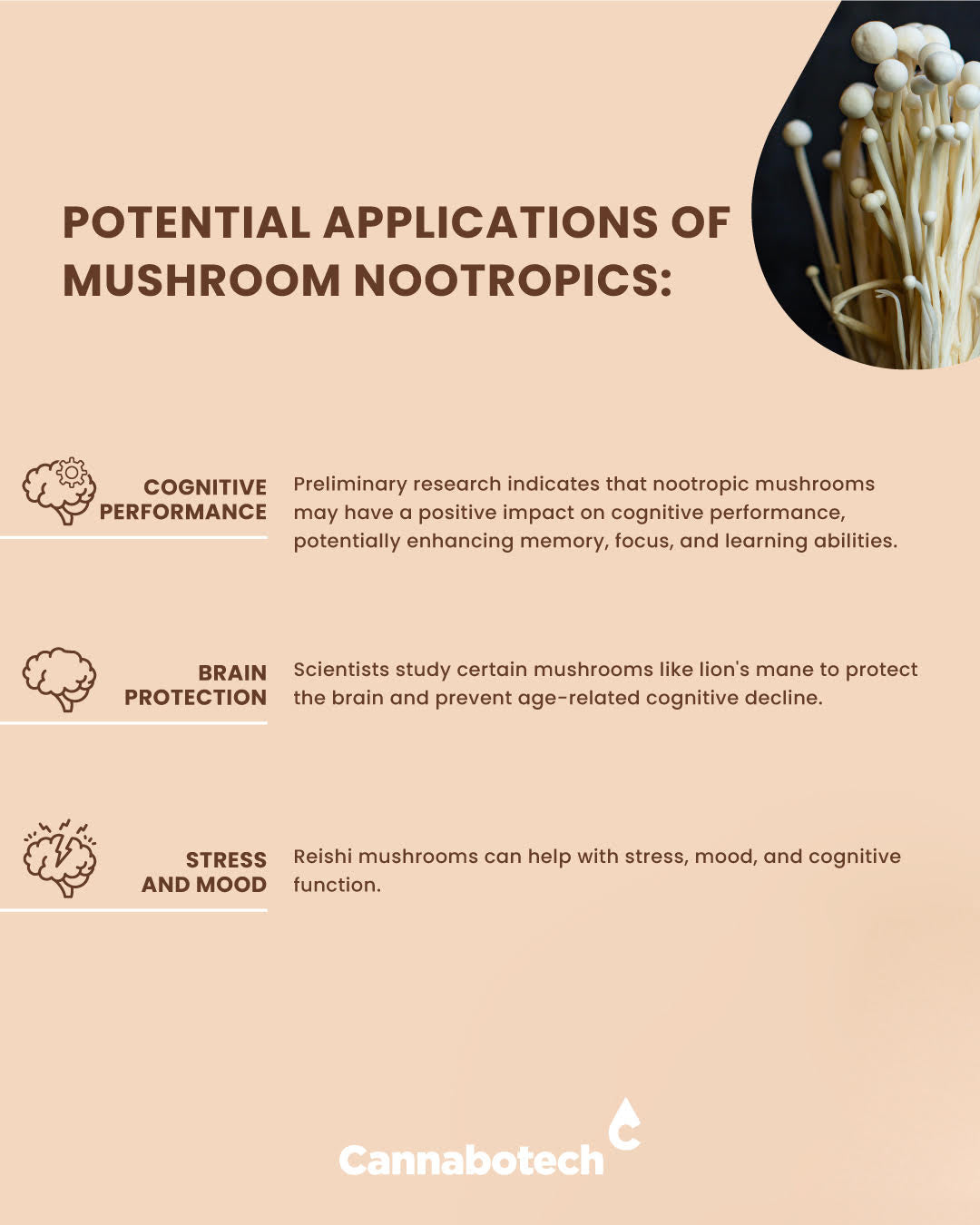People have tried various methods to enhance their thinking and mental health, like eating well, exercising, and taking supplements. One interesting area of research is the use of nootropic mushrooms, which are fungi believed to boost cognitive abilities.
What are Nootropic Mushrooms?

Nootropic mushrooms are nutritional supplements crafted from nutrient-packed functional mushrooms, highly esteemed worldwide for their potential to enhance mental clarity. In this article, we shall delve into the realm of nootropic mushrooms and contemplate whether they could serve
These mushrooms are important in traditional medicine. They are also gaining popularity in modern wellness communities for their ability to improve brain function. In this article, we will explore the world of nootropic mushrooms. We will look at their historical importance, potential benefits, and the scientific evidence behind their ability to enhance cognition.
Use Code: MYQUIZ for 15% OFF
Use Code: MYQUIZ for 15% OFF
SHOP MUSHROOM SUPPLEMENTS

Key Nootropic Mushrooms & their Benefits:
Reishi Mushroom (Ganoderma lucidum):
Reishi helps the body adapt to stress with its adaptogenic properties. It may also possess anti-inflammatory effects and promote a balanced mood, indirectly influencing cognitive function. Reishi (Ganoderma lucidum), also known as the "mushroom of immortality."
Reishi is a plant used in Chinese medicine for a long time. It helps with overall health and can make you live longer. It has special substances like triterpenes and polysaccharides that can fight against harmful things in your body.
Reishi can also help your brain by reducing stress and inflammation, which can make your memory and focus better.

Cordyceps Mushroom (Cordyceps sinensis):
Cordyceps may increase energy and stamina by improving oxygen use and ATP production. It can contribute to better cognitive performance. Cordyceps is a fungus that grows on bugs and is used in Tibetan and Chinese medicine for a while.
Cordyceps boosts brain function by enhancing oxygen use and blood flow. It also has cordycepin and adenosine, which can protect the brain and reduce inflammation.
Chaga Mushroom (Inonotus obliquus):
Chaga has lots of antioxidants and may shield against oxidative stress. potential immune-boosting properties may indirectly support cognitive health by reducing inflammation.
Lion's Mane (Hericium erinaceus):
The lion's mane mushroom looks like a lion's mane. It is used in Chinese medicine to help the brain and memory. It has hericenones and erinacines, which make nerve growth factor (NGF) in the brain. This helps neurons grow and stay healthy.
Lion's Mane Mushroom (Hericium The Lion's Mane mushroom resembles a lion's mane. It also aids in the production of nerve growth factor (NGF). NGF is crucial for the growth and maintenance of neurons. Reported benefits include improved memory, focus, and mental clarity.

The Scientific Basis of Nootropic Mushrooms:
While traditional uses provide anecdotal evidence, modern research is shedding light on the scientific foundation of nootropic mushrooms. Research shows that these fungi have substances that can improve brain function, like beta-glucans, polysaccharides, and triterpenes. For example, animal studies have linked lion's mane mushroom to increased NGF production, demonstrating its potential for neuroprotection.
The field of study surrounding the cognitive benefits of nootropic mushrooms is both fascinating and constantly evolving. Traditional use demonstrates that they can enhance cognitive function. However, modern research is currently uncovering the specific compounds and mechanisms responsible for their brain-boosting effects. Here are some important aspects of the scientific understanding behind nootropic mushrooms:

Beta-Glucans and Polysaccharides:
Nootropic mushrooms, such as lion's mane, reishi, and chaga, contain bioactive compounds like beta-glucans and polysaccharides. These substances may boost the immune system and work as antioxidants. Research suggests that beta-glucans, in particular, may play a role in the observed neuroprotective effects.
Stimulation of Nerve Growth Factor (NGF):
Lion's mane mushroom may help produce Nerve Growth Factor (NGF) by stimulating its production. NGF is a protein that is crucial for the growth, maintenance, and survival of neurons. By promoting NGF synthesis, lion's mane mushroom may support neuroplasticity and cognitive function.
Triterpenes and Adaptogenic Properties:
Some mushrooms, like reishi, have triterpenes that can help with adapting to stress. Adaptogens are substances that help the body adapt to stress and maintain a state of balance. These mushrooms can indirectly improve cognitive function by reducing the effects of stress on the body.
Anti-Inflammatory Effects:
Inflammation causes brain diseases and memory problems. Certain mushrooms, like chaga, can reduce inflammation. These mushrooms may help the immune system, reduce inflammation, and protect the brain from damage caused by chronic inflammation.
Antioxidant Activity:
Oxidative stress, from too many free radicals and not enough antioxidants, leads to aging and cognitive decline. Some substances in nootropic mushrooms can work as antioxidants, reducing oxidative stress and possibly protecting cognitive function.
Potential Applications of Mushroom Nootropics:
Cognitive Performance:
Preliminary research indicates that nootropic mushrooms may have a positive impact on cognitive performance, potentially enhancing memory, focus, and learning abilities.
Brain Protection:
Scientists study certain mushrooms like lion's mane to protect the brain and prevent age-related cognitive decline.
Stress and Mood:
Reishi mushrooms can help with stress, mood, and cognitive function.
How to Consume Nootropic Mushrooms
There are various ways to eat nootropic mushrooms, but it's important to remember that everyone reacts differently to them. Advisable to consult your doctor before including mushrooms in your diet. Here are several typical methods to ingest cognitive-enhancing fungi.
Dried Mushroom Capsules:
Dried mushroom capsules or powder-filled capsules are an extremely convenient option for consuming nootropic mushrooms. This method guarantees a precise and controlled dose, making it easy to add to your daily supplement routine. It is crucial to purchase high-quality capsules from reputable sources to guarantee their effectiveness and safety.
Mushroom Extracts:
Mushroom extracts are concentrated forms of the beneficial compounds found in nootropic mushrooms. These extracts are available in liquid or powder form, offering versatility for various applications. You can easily mix mushroom extracts into your morning coffee, tea, smoothies, or even water. This method allows for seamless integration into your daily beverages without significantly altering their taste.
Mushroom Nootropics Tinctures:
Tinctures are liquid extracts of mushrooms, typically preserved in alcohol or another solvent. They provide a potent and convenient way to consume nootropic mushrooms. Put a few drops of the tincture in water or a drink to easily and effectively get the mushrooms' benefits. This method ensures a swift and efficient means of consumption.
The safety level of mushroom nootropics is a crucial aspect to consider when incorporating them into your wellness routine. These natural supplements, derived from various mushroom species, have gained popularity for their potential cognitive-enhancing properties. However, it is important to ensure that the mushroom nootropics you choose are safe for consumption.
Are Nootropic Mushrooms Safe & How to Select them
To ascertain the safety of mushroom nootropics, seek out products that have undergone quality control and testing. Reputable manufacturers typically conduct third-party laboratory tests to guarantee their products are uncontaminated, potent, and devoid of detrimental substances.
This ensures that the mushroom nootropics you select are free from harmful substances and meet the highest safety standards.
Additionally, when choosing mushroom nootropics, it is beneficial to consider the source and cultivation practices. Opting for organic and sustainably grown mushrooms can minimize the risk of exposure to pesticides or other harmful chemicals.
Studying the specific mushroom types in the nootropic supplement can provide information about their traditional use. It can also provide information about possible side effects and overall safety.
Talk to a doctor or expert to find the safest mushroom nootropics for you.
Conclusion
People have tried various methods to enhance their thinking and mental health, like eating well, exercising, and taking supplements. One interesting area of research is the use of nootropic mushrooms, which are fungi believed to boost cognitive abilities.
Nootropic mushrooms are important in traditional medicine and becoming popular in wellness communities. They enhance brain function.. In this article, we will explore the world of these mushrooms. Using nootropic mushrooms in your diet or wellness routine can improve your brain and body.
They can enhance cognition, boost your immune system, and protect against disease. These mushrooms can help your health. They are natural and work well. People will like them more as we learn more about their benefits.
Many people are turning to natural remedies for cognitive enhancement, and nootropic mushrooms offer a promising option. It's important to use these mushrooms in moderation and with guidance from a











